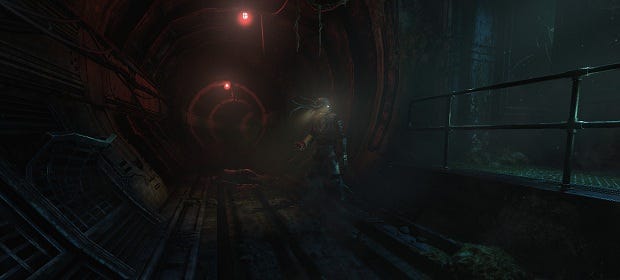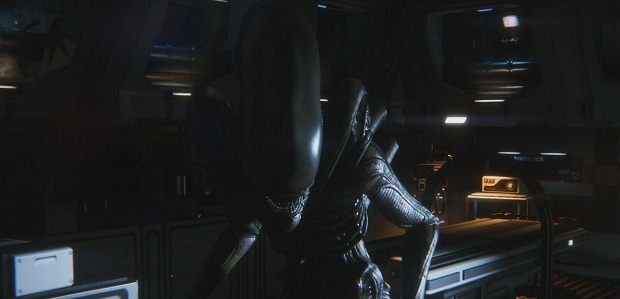Frictional Thoughts: Alien, Amnesia And Horror Simulators
The future of horror simulation
Over at Frictional Games' official blog, creative director Thomas Grip has written an extensive and thoughtful analysis of Alien: Isolation. It's worth reading in full, providing a brief history of the 'horror simulator' genre that runs from 3D Monster Maze (1982) to the modern interpretations found in Slender and the like. Isolation gets a post-mortem treatment that begins simply - "Alien: Isolation is an interesting game" - then veers into a wham-bam takedown - "At its core it fails to be a faithful emulation of the original Alien (1979) movie" - and, BOOM - "it really is just a pure horror simulator, like Slender or 3D Monster Maze, just with more sections to play through".
Grip does have lots of positive things to say about Creative Assembly's game though and a few thoughts for the future. That's SOMA talk.
Note: the full blog post contains what I'd consider to be spoilers for Isolation. I haven't included any below.
Grip divides horror games into two broad fields - those that play out in the style of a known genre but with a horror wrapping, and those that attempt to "recreate the happenings of a scary movie/novel". These latter he calls 'horror simulation' games and 3D Monster Maze is selected as the earliest example. Character in maze must avoid entity in maze. That's a different proposition to something like Dark Seed, which is a point and click adventure with 'horror wrapping' and a conveniently topical Giger-fuelled visual design.
Isolation, Grip argues, is very similar, at its base, to 3D Monster Maze.
The big feature in this game is that there is only one monster that can appear at any time. In many ways, it is really the 2014 version of 3D Monster Maze, in which the whole game was built around trying to figure out where the monster was located and how to avoid it. Alien: Isolation obviously has complexity far beyond that, but it is striking how similar the basics are.
He does talk about the human and android adversaries as well, but I think it's fair to classify the alien as the 'one monster' in the game. That's a fine distinction to make between one deadly force and all the others, but the fiction and the simulation both support it. The alien does not behave like the rest and it is not treated like the rest. Where Isolation fails, for Grip, is in the frustration that arises from the unpredictability of the alien. He's not alone in that.
...this super focus on being a horror simulation, also starts showing cracks in the game as a whole. For instance, just like in older games of the same genre, Alien: Isolation can be very frustrating. The tension built up from being 20 minutes from your last save, quickly turns to anger and frustration when you are killed seemingly out of nowhere. While still vague (which is essential for giving rise to the right mind model), it is predictable enough for you to be able to get past any threats if you are just careful and cunning enough. Still, this part is divisive, as can be seen by the review scores and I have myself felt extremely frustrated with the game from time to time.
It certainly has been divisive. I think it's a flawed masterpiece but I can understand why some people will find the flaws too damaging and distinctive. I think the majority of the game's frustrations arise from a determination to follow a very deliberate series of design choices to the letter rather than a failure to achieve any desired objectives. Where it fails, it fails in good faith and is fully prepared to feel the pain of its own petard.
Grip makes it clear that he doesn't consider these problems to be indicative of a failure.
While the frustration and bad pacing are clearly issues, I do not think they are that bad and, as noted above, it should be relatively easy to fix. What is a much bigger problem is how these system gives rise to a very simplistic narrative.
This is a much more interesting point and one that I struggled with myself. Grip isn't talking about the game's story here, in the larger sense, but about the narrative that is created and controlled by player action. It is, he reckons, a narrative of moving from one save point to the next, occasionally activating a piece of machinery or searching for a keycard.
The problems with objectives does not stop there though. Another issue is that they are all extremely simplistic and without any interesting narrative significance. They are all about powering up things or finding keycards. It is old school mission design with a thin layer of narrative coating. While these sort of boring objectives are pretty common in games, I think Alien: Isolation has an especially hard time getting away from it. Because the game is constantly so dense with information that you need to keep track of (save stations, motion tracker, alien signs, loot, resources, etc) you really cannot manage to keep any complex objectives in mind.
I don't necessarily disagree, even though I think Isolation is an excellent game. Would I have preferred objectives and flow that didn't occasionally remind me of playing repairman in Dead Space? Yes I would. But I found the interactions and the world that has been constructed around those objectives sufficiently engaging, even during the slightly baggy middle portion. Grip goes on to discuss how the problems he perceives might be fixed - having admitted that Amnesia was riddled with some of the same issues - and that's when he turns to SOMA, the company's next game.
I think that the answer lies in having some sort of uncertain outcome as an ingrained gameplay device. Instead of having the player fear "what if I lose my progress?" they should be thinking "what if I affect the world in a negative way?"
A beautiful idea. In the majority of games, death has consequences for the player but not for the character or world, and that's a problem if you want to teach people to fear failure. The fear becomes frustration if they are punished but the character simply revives at a save point and has to run the gauntlet again. But how to make the change?
This is what we are currently experimenting with in our upcoming game SOMA. Since I do not want to spoil the system I cannot go too in-depth on our approach, but I can give a basic outline. The idea is that by having choices inserted directly into the game world and have the way you chose to handle these change how the narrative unravels. These choices can simply be whether you interact with a certain object or not, or it can be more vague things, like how you behave around a certain creature.
Not branches in the narrative but smaller changes, some of them systemic, based on player behaviour and choice.
Our hope is that by having these sort of decisions as an integral part of the game world, that the player internalizes them and makes it part of their mind model. Then, just like the tension you feel by wondering where the next save station is in Alien: Isolation, you will feel tension by pondering what ramifications a certain set of actions might have.
Exciting. I think it's important to make the distinction between 'behaviour' and 'choice'. Games like The Walking Dead present choices that alter (or don't alter) later events, while a game that doesn't present binary choices but instead changes based on the player's actions from moment to moment would be something altogether different. It's something that we see in dynamic difficulty levels but it'd be fascinating to see it applied directly to a horror template.
As for Grip's contention that Isolation fails as an emulation of the original film? Again, he's right, even though I entirely disagree with the statement. That's because I approached the question as to whether Isolation is a success in that regard or not from an entirely different angle, although not without acknowledging Grip's take. Put simply, he believes that Isolation fails because it is not about the unknown - it is about a known entity, the alien itself, and the repetition of dealing with that entity means that we come to know even more about it. The horror and the mystery are lost, at least in part.
Hard to argue with that. In my review, I speculated that the alien is Isolation's weakness in some ways, because the tension that builds in the opening scenes, before meeting the creature, is built on Ripley's lack of knowledge. She doesn't know what she's up against and the fact that we do creates a distancing effect.
But Alien isn't just about an alien. It's about an entire world, interpreted and imagined through the glimpses of work and life that we're shown. That's what Isolation seems to understand and to deliver so effectively. If SOMA can create a credible sense of place to go with its clever ideas, it can't come soon enough.













